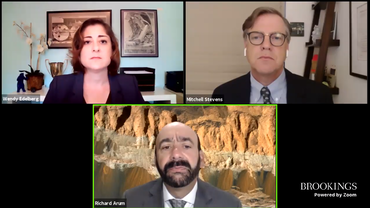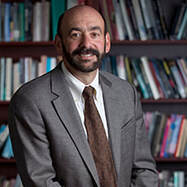Dean Arum presents proposal to support higher education
and workforce needs in face of pandemic
|
UCI School of Education Dean Richard Arum presented a proposal to ensure that traditional colleges and universities, as well as federal college funding programs, respond to the acute learning needs brought on by the pandemic and successfully prepare the future workforce during an event hosted by The Hamilton Project at the Brookings Institution.
“The moment we are in simultaneously involves crisis and opportunities,” Arum said. “Higher education and workforce training systems are segregated in our country, resources are scarce, global competition is fierce, and COVID-19 has exacerbated the challenges.” Arum and proposal co-author Mitchell Stevens, Stanford Graduate School of Education, detailed their proposal, which includes two initiatives. |

Dean Richard Arum (bottom) presents a proposal to address higher education and workforce needs at a Hamilton Project event on Oct. 8. Top left: Wendy Edelberg, director of The Hamilton Project. Top right, Mitchell Stevens, co-author of the proposal and professor, Stanford Graduate School of Education.
|
Under the first initiative, the federal government issues Learning Opportunity Credits (LOCs) to all U.S. adults who are either unemployed or who received the Earned Income Tax Credit (EITC). LOCs will promote ongoing workforce training as well as the expansion of high-quality hybrid learning opportunities.
“This would be restricted to public and nonprofit accredited institutions and program partners, and LOC partners must certify that they’ve involved local businesses in identifying local business needs,” Arum said. “Also, in order to access LOC credits, institutions must agree to provide at least 50 percent of student experiences online, and share that data with a national entity that would be stood up to ensure transparency and improve the science of learning.”
“This would be restricted to public and nonprofit accredited institutions and program partners, and LOC partners must certify that they’ve involved local businesses in identifying local business needs,” Arum said. “Also, in order to access LOC credits, institutions must agree to provide at least 50 percent of student experiences online, and share that data with a national entity that would be stood up to ensure transparency and improve the science of learning.”
|
Under the second initiative, the federal government established a national project on the Future of Learning, Opportunity, and Work (FLOW), a distributed collaboration between existing federal agencies and a network of competitively selected U.S. universities and their partners. FLOW will accumulate knowledge and inform policy on adult learning to serve the national interest moving forward.
“It’s much easier in this country to make an informed decision when buying a used car than it is when investing in a postsecondary learning institution,” Stevens said. “Schools making use of LOCs would provide detailed information on learning outcomes to a nationally distributed research project. In doing so, we can identify which programs work for which learners in which sectors, and perhaps in which regions of the country.” |
|
Both Arum and Stevens historicized the role of higher education during times of crises in the country.
“There has not been a time in our country’s history where higher education, when asked, has not stepped up to the plate and committed itself to national service,” Arum said.
“During times of war and calamity, the federal government has consistently called upon colleges and universities to provide new resources, and for them to mobilize and utilize human capital,” Stevens added. “The current conditions allow us to really move the furniture around.”
“There has not been a time in our country’s history where higher education, when asked, has not stepped up to the plate and committed itself to national service,” Arum said.
“During times of war and calamity, the federal government has consistently called upon colleges and universities to provide new resources, and for them to mobilize and utilize human capital,” Stevens added. “The current conditions allow us to really move the furniture around.”
In February, the UCI School of Education, in partnership with ETS, hosted executive leadership from school districts and community colleges, nonprofits, think tanks, and businesses to discuss modern competencies and future workforce needs.
“As a world-class School of Education in the heart of Orange County – the home to leading industry and a diverse citizenry of more than three million people – it is important that we are continuously exploring how to prepare students to be successful in the 21st century workplace,” Arum said in February.
Arum is also principal investigator of The Next Generation Undergraduate Success Measurement Project, a state-of-the-art measurement project that is improving our understanding of the value of undergraduate educational experiences and promoting evidence-based models of undergraduate student success.
The October 8 presentation was highlighted in The Hamilton Project event, “Higher Education & COVID-19: The Future of Learning, Opportunity, and Work.” Wendy Edelberg, director of The Hamilton Project and senior fellow, Economic Studies at The Brookings Institution, moderated the discussion.
The webcast event also featured introductory remarks by Rep. Bobby Scott (Va.-03), chairman of the U.S. House Committee on Education and Labor, as well as a panel of higher education policymakers and practitioners that discussed policy options to strengthen higher education and workforce development.
“As a world-class School of Education in the heart of Orange County – the home to leading industry and a diverse citizenry of more than three million people – it is important that we are continuously exploring how to prepare students to be successful in the 21st century workplace,” Arum said in February.
Arum is also principal investigator of The Next Generation Undergraduate Success Measurement Project, a state-of-the-art measurement project that is improving our understanding of the value of undergraduate educational experiences and promoting evidence-based models of undergraduate student success.
The October 8 presentation was highlighted in The Hamilton Project event, “Higher Education & COVID-19: The Future of Learning, Opportunity, and Work.” Wendy Edelberg, director of The Hamilton Project and senior fellow, Economic Studies at The Brookings Institution, moderated the discussion.
The webcast event also featured introductory remarks by Rep. Bobby Scott (Va.-03), chairman of the U.S. House Committee on Education and Labor, as well as a panel of higher education policymakers and practitioners that discussed policy options to strengthen higher education and workforce development.


